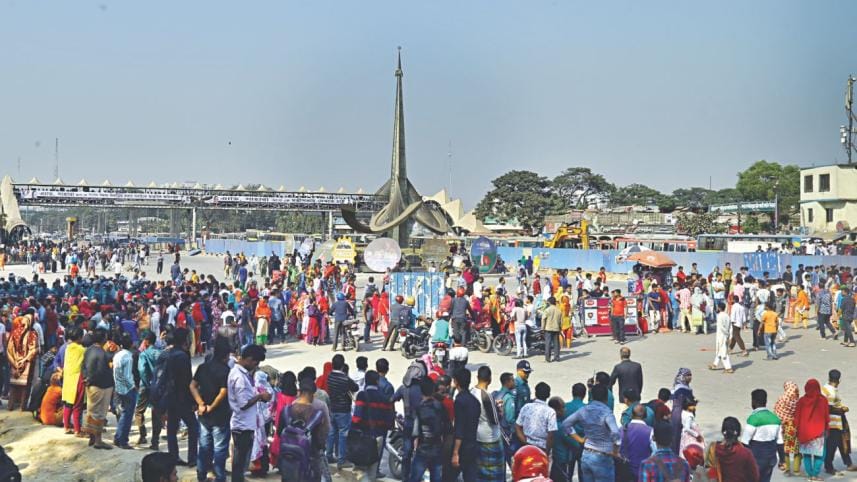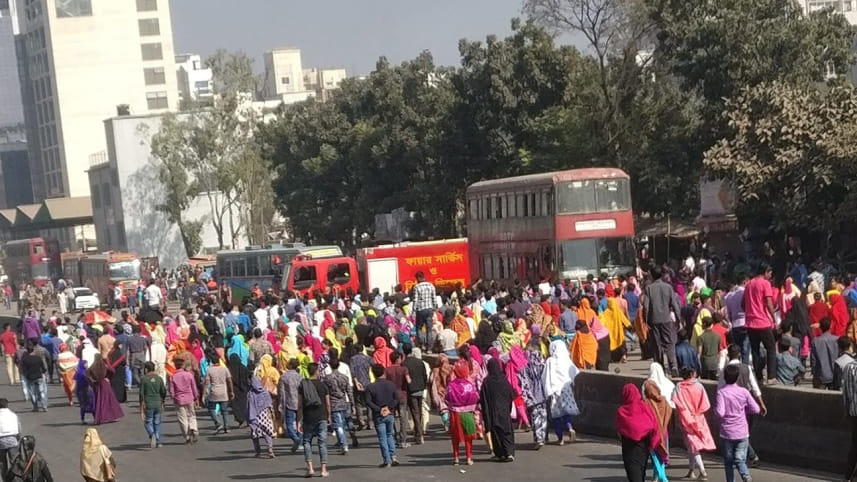RMG workers' demo stalls city artery

Thousands of passengers suffered massive traffic congestion yesterday as garment workers blocked the Dhaka-Mymensingh highway, demanding a raise, for five hours at the city's Uttara.
The agitated workers withdrew their sit-in that started at 9:00am in the morning, after a discussion with some factory owners and police at 2:00pm, said Navid Kamal Shoibal, deputy commissioner (Uttara Division) of Dhaka Metropolitan Police.
“We started the discussion as the workers started their demonstrations. Finally, they agreed to withdraw the agitation programme around 2:00pm,” Shoibal added.
More than 5,000 workers from around 20 garment factories, located at Azampur and Abdullahpur, staged demonstrations at 9:00am demanding the payment of salary and a raise.
Even airport-bound passengers were trapped in their respective vehicles, commuters said.
Passengers heading towards Mymensingh, Netrakona, Sherpur, Gazipur, Manikganj, Tangail, Kishoreganj and Jamalpur districts also suffered because of the roadblock.
Motiur Rahman, who returned to Dhaka after performing Umrah, said he and 27 of his friends were stuck in Uttara for four hours. They were going to their ancestral home at Bhaluka from the airport.
The workers said the monthly wage in the seventh grade increased to Tk 8,000 from Tk 5,300 as per the latest gazette published by the government last year. But, the salary of the workers in other grades did not increase at the same rate.
The salary hike for the entry-level workers was more than that of their senior operators, who have been working for more than seven to eight years. The new wage has been effective from December 1. Major disparity in the salary hike was noticed in the third and fourth grades as their salaries were not raised like that of entry-level workers.
In most of the grades, other than the seventh, only Tk 500 was raised in the new salary structure, whereas an entry-level worker's salary had increased by Tk 2,700 at one go.
“The management of my factory did not increase my basic. They only increased house rent and medical allowance. They also did not increase the five percent annual increment either,” said Mohammad Joynal, a sewing operator at a garment factory in Uttara.
As per the new wage structure, his salary is now Tk 9,200, up from more than Tk 7,000. According to Joynal's calculation, his salary should have been Tk 10,500.
Monowara Begum, Rozina Khatun and many other workers echoed the same views.
Speaking to The Daily Star, Siddiqur Rahman, president of the Bangladesh Garment Manufacturers and Exporters Association (BGMEA), said factory owners had been implementing the new salary structure as per the government gazette.
“The salary has been hiked following the same formula that was previously followed,” he said.
“Still, if any worker feels their salary has not been hiked following the gazette, they can discuss it with the factory management for a solution,” Rahman said, adding that after the publication of the gazette, BGMEA leaders held several meetings with factory owners and labour leaders apprehending labour unrest.
Last month, a tripartite committee of government representatives, BGMEA leaders and workers' leaders decided to resolve any crisis through discussion, he said.
The factory owners, during a meeting on Thursday, decided to implement the new salary structure following the gazette, Rahman said.
Earlier in January last year, the government formed the wage board for 4.4 million garment workers. It recommended the minimum wage for the garment workers at Tk 8,000 from Tk 5,300 in September last year.
The board also recommended the salaries of other six grades including transport, meal, house rent and other allowances.
The minimum wage was chronologically fixed at Tk 5,300 in 2013, up from Tk 3,000 in 2010, Tk 1,662.5 in 2006, Tk 940 in 1994 and Tk 627 in 1985.




 For all latest news, follow The Daily Star's Google News channel.
For all latest news, follow The Daily Star's Google News channel.
Comments